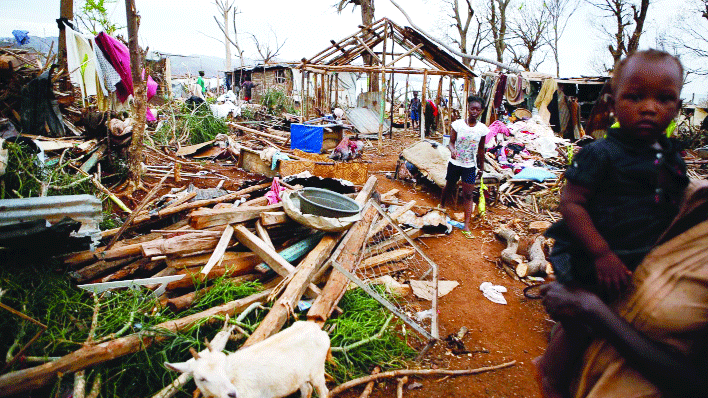The Paris agenda requires a sharp and early reduction of aggregate emissions of GHGs at the global level, and a sincere attempt to address the inequitable manner in which climate change has been dealt with thus far
In November, the Paris agreement on climate change is expected to come into existence with the requisite number of countries accounting for a 55 per cent share of emissions of global greenhouse gases (GHGs) having ratified the agreement.
That is indeed a welcome development given the fact that the United Nations Framework Convention on Climate Change (UNFCCC) is now almost a quarter century old. But, in itself, the commitments made by the countries which are party to this agreement do not add up to emissions reduction levels which would ensure that the world moves on to a path which assures limiting temperature increase to two degrees celsius by the end of this century over pre-industrial levels.
Meanwhile, the impacts of climate change continue to become more widespread and harmful. And, the issues of equity that are at the core of the UNFCCC have really not been addressed by the global community. Hence, there is no reason for euphoria, since the most intractable issues, centering around the concept of “common but differentiated responsibility”, enshrined in the UNFCCC have not been solved.
The Intergovernmental Panel on Climate Change (IPCC) in its Fifth Assessment Report (AR5) clearly pointed out that “Climate change will amplify existing risks and create new risks for natural and human systems. Risks are unevenly distributed and are generally greater for disadvantaged people and communities in countries at all levels of development”.
An example of the vulnerability of poor communities and disadvantaged people can be seen in the devastation caused by Hurricane Matthew in Haiti, one of the poorest countries in the world, where almost a thousand lives were lost and a large part of the population left homeless and exposed to disease and starvation.
The Category 4 hurricane hit the entire breadth of this nation with winds at around 172 km per hour, bringing with it heavy rain and flooding. Entire slopes with crops growing on them were washed away, which cannot be recovered from any relief efforts that were mounted in response to the destruction caused.
In general, the developed countries were to provide adequate funds for the developing nations to undertake mitigation and adaptation measures to deal with climate change, but so far the results achieved have remained abysmal, despite the goal of $100 billion being targeted for the Green Climate Fund by 2020.
Poor nations of the world are largely unprepared for managing the risks of climate-related disasters, and one of the major contributions of funds and know-how from the developed nations would have been the creation of capacity to deal with these disasters, including the establishment of early warning systems.
A country like Haiti, in the neighbourhood of one of the most prosperous regions of the world, could have minimised the damage that it has suffered from Hurricane Matthew, had it received help for creating climate resilience to deal with such disasters. The Caribbean region and Central America are known to be vulnerable to hurricanes which are becoming more frequent and more severe.
The AR5 has clearly stated that “It is virtually certain that intense tropical cyclone activity has increased in the North Atlantic since 1970”. The UN has classified 52 states as Small Islands Developing States (SIDS), and as a group, these represent some of the most vulnerable communities in the world. Their well-being and reduction of exposure to risk is an important part of the global agenda, which must be addressed, alongwith the situation in a number of least developed countries.
The second part of the unfinished agenda from Paris relates to the inadequate level of collective ambition to reduce emissions of GHGs in the developed world. As a result, the world remains on a path which has no prospect of maintaining the target of temperature increase below two degrees by the year 2100.
“Without additional mitigation efforts beyond those in place today, and even with adaptation, warming by the end of the 21st century will lead to high to very high risk of severe, widespread and irreversible impacts globally”. The pathway of concentration of GHGs which would provide assurance of keeping below the two degree limit by 2100 requires a reduction of 40 per cent to 70 per cent in GHG emissions by the middle of this century over 2010 levels, and a further reduction to zero or negative emissions by 2100.
The bulk of this effort has to come immediately from the developed countries, in keeping with the principle of common but differentiated responsibility. The AR5 had estimated that if at the beginning of industrialisation a budget had to be provided on how much carbon dioxide could be emitted to ensure that we do not exceed the two degree target, we would have come up with a figure of 2,900 gigatonnes(Gt) of carbon dioxide.
By 2011, the world had already used up 1,900 Gt of this budget, and today, the total would possibly be close to 2,100 Gt. Hence, if we have to keep the earth’s average temperature below two degrees Celsius by 2100, we have a limit of only perhaps 900 Gt of emissions left in the budget for emissions.
If the developed world continues to emit GHGs, the developing world would have no space left to remove poverty and reach decent standards of living. Some equitable distribution of the carbon budget that remains is essential in the interest of fairness and justice.
The agenda from Paris, therefore, requires a sharp and early reduction of aggregate emissions of GHGs at the global level, and a sincere attempt to address the inequitable manner in which climate change has been dealt with thus far. Adequate funding of actions in the developing world would be an important part of the unfinished business of Paris.
Developing countries should not pursue the pattern of development established by the industrialised countries, nor should they repeat the mistakes which have led to damage to our global commons, but a world with huge disparities, as we have today, will never ensure a stable or peaceful system.
World leaders have to see the future of human society as an interdependent reality, where ignoring the principles of justice for all would not be in the interest of any nation.
(The writer is former chairman, TERI)
(The accompanying visual is of debris outside homes after Hurricane Matthew hit Haiti. AP photo)


























